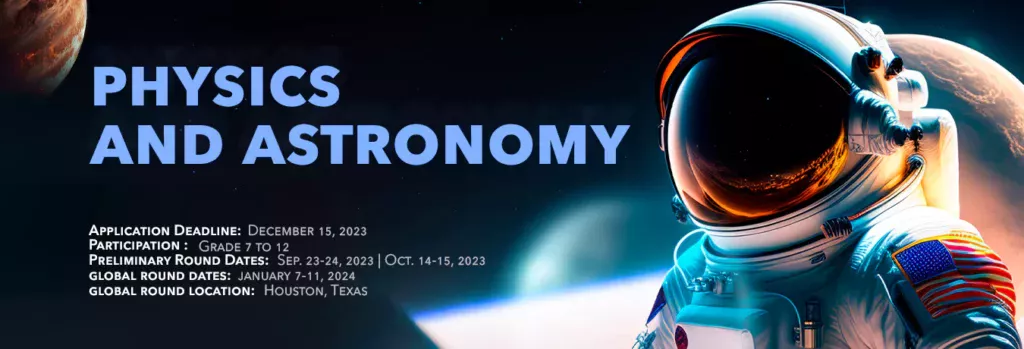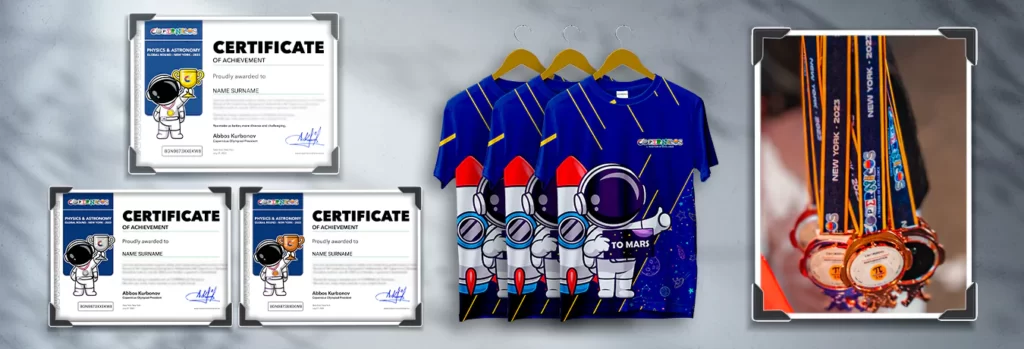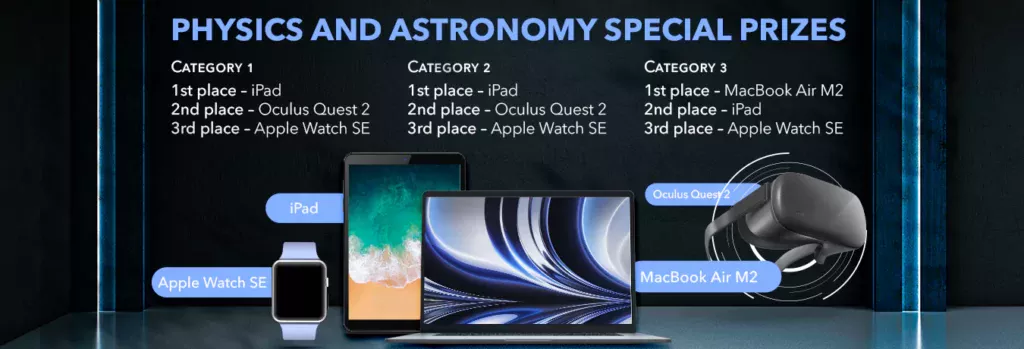
Physics and Astronomy Olympiad
About Copernicus Physics and Astronomy Olympiad
Physics and astronomy are not merely academic disciplines; they are the cornerstones of our understanding of the universe and the forces that govern it. Physics delves into the fundamental laws of nature, unraveling the mysteries of how matter, energy, and the fundamental forces of the universe interact. Astronomy, on the other hand, peers into the vast expanse of the cosmos, revealing the breathtaking beauty and complexity of celestial objects while offering insights into the origin and fate of our universe. Together, these fields provide us with a profound perspective on our place in the cosmos and the tools to address some of the most pressing questions about the nature of reality.
Competitions that test knowledge in physics and astronomy serve a pivotal role in education and society. The goal of Copernicus Physics and Astronomy Olympiad is to encourage students to delve deeper into these subjects, fostering a love for learning and intellectual curiosity. The Copernicus Physics and Astronomy Olympiad hone critical thinking and problem-solving skills by pitting young minds against challenging problems and encouraging teamwork. Moreover, this competition creates a platform for budding scientists and astronomers to showcase their talents and innovations, ultimately nurturing the next generation of thinkers who will shape the future of science and technology. In a world increasingly reliant on scientific advancements, fostering expertise in physics and astronomy through competition is not just valuable; it’s essential for the progress and well-being of humanity.
Copernicus Physics and Astronomy Olympiad Mechanics
- The Copernicus Physics and Astronomy Olympiad is an international event that is open to students from Grade 7 to 12.
- It is divided into two rounds – the Preliminary Round and the Global Round.
- Students can register to the event through an online registration via Copernicus Olympiad website or via official country representatives.
- All registered participants will take the online qualifying exam for the Preliminary Round which will be held on September 23-24 and October 14-15, 2023.
The online qualifying exam has 25 multiple choice questions that will be administered for 60 minutes. Students must choose the online qualifying exam from the category they belong to. The categories are as follows:
- Category 1 – Grade 7 and 8
- Category 2 – Grade 9 and 10
- Category 3 – Grade 11 and 12
- The Preliminary Round exam is all about Physics and Astronomy with sub-topics indicated in the syllabus provided.
- Students who get at least 40% in the qualifying exam become eligible to participate the Global Round.
- Regardless of score, all participants of Preliminary Round will receive a Certificate of Participation.
- Students who qualify for the Global Round will be awarded with a Certificate of Achievement and a medal according to the score they got in the Preliminary Round exam.
- 40% to 49% – Honorable Mention Certificate
- 50% to 74% – Bronze Medal
- 75% to 90% – Silver Medal + 5% off in the Global Round registration fees
- 91% to 100% – Gold Medal + 10% off in the Global Round registration fees
- Qualifiers to the Global Round must register again to the website or through official country representatives to indicate important travel documentation.
- The Global Round will be held between January 7 and 11, 2024 in Houston Texas.
- The Global Round is a combination of exam, interactive challenges, and tour quizzes.
- The Global Round Exam consists of 25 multiple choice questions about Physics and Astronomy, with subtopics listed in the syllabus.
- The Global Round Exam consists of 25 multiple choice questions about Physics and Astronomy, with subtopics listed in the syllabus.
○ The Interactive Challenges are as follows:
- Problem-Solving Challenge is a set of different physics games and puzzles to feed the interests of the young minds. It is basically a fun and exciting segment during the event, with the application of the learning in different fields of science.
- On-the-Spot Challenge is the part of the competition that is composed of impromptu challenges that allow students to put into practice their knowledge on astronomy. This provides an opportunity to learn astronomy in a more tangible way.
Note that students have an option to do the interactive challenge individually or by team. There could only be a maximum of 3 students per team and students must belong to the same grade level groupings. Should students decide to group together, their team score will be their individual score at the end of the challenge.
- The Tour Quizzes are 5 to 10 item questions that students will answer as they visit various educational places as part of the Physics and Astronomy Olympiad tour package.
- To determine the winners, scores of participants for each round will be gathered and computed based on the given percentages. Take note that scores will be computed individually.
- Global Round Exam = 80%
- Interactive Challenges = 10%
- Tour Quizzes = 10%
- Total = 100%

- In the Global Round, medals will be awarded based on the following percentages:
- The top 10% will receive a Gold Medal.
- The next 11-30% will receive a Silver Medal.
- The next 31-60% will receive a Bronze Medal.
- The next 61-75% will receive an Honorable Mention Certificate.
Moreover, the Top Three students in each category of the Global Round will receive special prizes listed below:

Syllabus of the Physics and Astronomy Olympiad
Syllabus | Physics | Astronomy |
|---|---|---|
Category 1 (Grade 7 and 8) | • Newton’s laws of motions • Types of forces • Speed, velocity, and acceleration • Simple machines • Forms of energy • Energy transformation • Conservation of energy • Properties of sound waves • Sound dispersion and the Doppler effect • Properties of light • Behavior of light • Lenses and their application • Electromagnetic spectrum • Electric circuits and components • Heat transfer • Properties of fluids • Fluids dynamics • Buoyancy and Archimedes principle | • The Sun • Moon, asteroids, and planets • Asteroid belt and Kuiper belt • Celestial motions • Day and night, seasons, and moon phases • Eclipses • Stars and their characteristics • Constellations and their cultural significance • Life cycle of stars • Types of galaxies • The Big Bang Theory • Meteor showers • Auroras |
Category 2 (Grade 9 and 10) | • Kinematics (motion in one and two dimensions) • Circular motion and gravitation • Work, power, and energy • Temperature, heat, and thermal expansion • Laws of thermodynamics • Conduction, convection, and radiation • Electric circuit and Ohm’s law • Electric potential, voltage, and current • Magnetic fields and electromagnetism • Wave properties • Sound waves, their characteristics, and behavior • The Doppler effect and wave interference • Electric charges and fields • Coulomb’s law and electric potential energy. • Electric flux and Gauss’s law • Quantum mechanics and the behavior of subatomic particles. • The photoelectric effect and wave-particle duality. • Nuclear physics (atomic structure, radioactivity) • The behavior of gases and gas laws (Boyle’s law, Charles’s law, etc.). • Ideal gas law and kinetic molecular theory | • Detailed study of the Sun and its properties. • The life cycle of stars, including their birth, evolution, and death • Stellar properties, such as luminosity, temperature, and size. • Stellar classification and the Hertzsprung-Russell diagram. • Types of galaxies (spiral, elliptical, irregular). • Galactic structure and the Milky Way. • The concept of the expanding universe and its implications • The Big Bang theory and the origin of the universe. • Dark matter and dark energy. • The cosmic microwave background radiation • The study of exoplanets and their potential habitability. • The search for extraterrestrial life. • The Drake Equation and the Fermi Paradox • Supernovae and black holes. • Gamma-ray bursts and quasars. • The study of cosmic phenomena using telescopes and space missions |
Category 3 (Grade 11 and 12) | • Conservation laws (momentum, angular momentum) • Impulse and collisions • Rotational motion and torque • Gravitation beyond basic concepts • Kinetic theory of gases • Thermodynamic processes (isothermal, adiabatic, etc.) • Entropy and the second law of thermodynamics • Electromagnetic induction • Faraday’s law of electromagnetic induction. • Lenz’s law • Alternating current (AC) circuits • Interference and diffraction of light • Polarization of light • Modern optics, including wave-particle duality. • Quantum mechanics in the context of light and photons • Special theory of relativity. • Quantum mechanics, wave functions, and probability. • Atomic and molecular physics. • Nuclear physics and particle physics | • Stellar formation and evolution, including the life cycles of various types of stars • Stellar nucleosynthesis and the creation of elements • Supernovae and neutron stars • The structure and dynamics of galaxies • Active galactic nuclei, including quasars and blazars • Galaxy clusters and the large-scale structure of the universe • The expanding universe and the Hubble law • Cosmic microwave background radiation • Dark matter, dark energy, and the fate of the universe • Inflationary theory and the Big Bang |